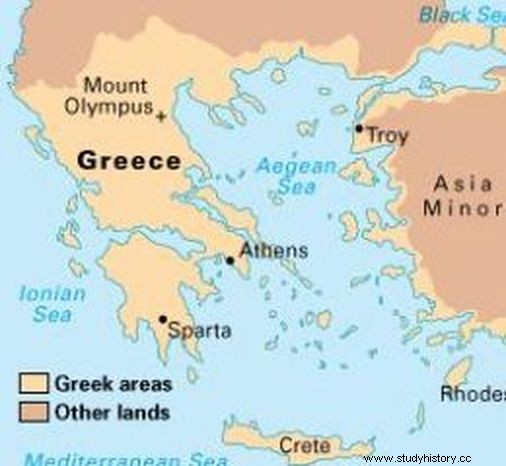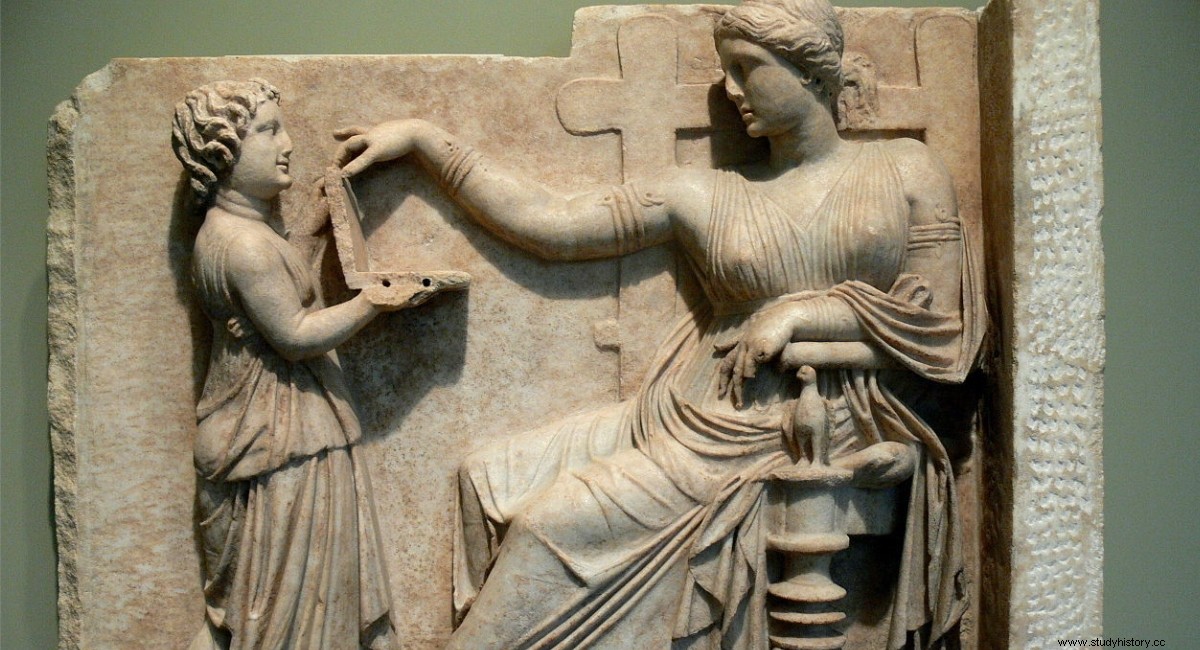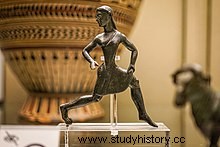Long before the rise of feminism and women's rights, women in classical antiquity did not have such an easy life. The term "Classical Greece" and the term popular culture can evoke famous names such as Hippocrates and Aristotle, which can project a sense of strong masculine influence. Similarly, the emergence of patriarchal societies resulted in few rights for women in the ancient world. While all women in classical Greece experienced this patriarchy, their experiences were not uniform, in this blog I will analyze the different societies of Athens and Sparta, the two most important Greek poleis, to demonstrate the differences in women's experience of patriarchy in classical Greece.

Women in Ancient Athens
Generally considered the birthplace of philosophy, the capital Athens was certainly no stranger to great scholars, artists and politicians, but it seems that men dominated these roles.
In Athens, citizenship was very important, especially after the democratic reforms of the 1930s, which allowed citizens to own land and hold political positions after the age of 13. There was no political voice for women in ancient Athens. All men were citizens of the city and women were excluded (only XNUMX). This exclusion meant that women had no political rights, could not own land, represented power in ancient Athens, and could not hold public office. Roger Just comes up with a very interesting point Women in Athenian Law and Life :in democratic Athens, women had fewer opportunities than in other periods of the city's history because:
In narrowly oligarchic, aristocratic or monarchical states, women belonging to the elite have often had considerable power, even though they were illegitimate; on the other hand, since the majority of the population, whether male or female, did not have political rights, politics was not something that generally separated men from women. But in Athenian democracy, there were no backward thrones that women could rule, while the access that every adult Athenian man had to the offices and honors of the state separated the citizen's life sharply from that of his wife or daughter (Women in Athenian Law). and life ").
Despite such limitations, women were an important part of Athenian culture, since a full-fledged Athenian citizen was not only born of an Athenian father, but was also a product of an Athenian mother who was properly matched with a man by her family. In the same way, "the freedom of everyday movement for women varied from social class to social class, and from police to police" ("Greek Attitudes Towards Sex", "Gender Rolles" section, para. 7). Every effort was made to restrict Athenian women to the household and to separate them from public life, as "a wife's main duty was to create legitimate heirs for her husband's household" ("Women in Greece", "Women's Role in the Household" "paragraph 1) while the men were considered the heads of the family. One possible explanation for this patriarchy may lie in the agricultural, land-based economy of early Greece, and such treatment could certainly have increased with the use of trade and naval networks. The sanctity of paternity was of paramount importance to a family's social status, and further emphasis on such segregation lies in the idealized documentation of qualities belonging to a virtuous Athenian bride:silent, docile, isolated, and morally dependent on her husbands.
The old women of Athens had very little choice when it came to choosing a lifestyle. Those who were so lucky could read a little, play an instrument and had slaves to do the daily chores around the house. It was illegal for women to vote or own property, and they could neither choose who to marry nor own anything of great value. It was a woman's duty in ancient Athens to stay at home, look her best, and have children. Her life centered on household chores and caring for the family. During this era of patriarchy, women were transferred from fathers and brothers to husbands so that they could not be taken back by their fathers after giving birth ("Ancient Athenian Women:Rolls and Typical Lifestyles").
A young Athenian woman's ultimate goal was marriage. Women usually gave a dowry, which varied greatly by class and family wealth. Originally, dowry was a way for women to find husbands, as well as a place where they could keep them safe. Their purpose was misunderstood, and as a result, the husband often squandered the dowry. When a marriage was not successful, the dowry was usually returned to the bride's father or kyrios (male guardian). At birth she would have been her father, and in the event of his death, any of his male relatives could take his place (Schaps 164). At her marriage, her husband became kyrios . All the money or property she acquired by inheritance or death became the property of her household, which was governed by kyrios . There is no evidence that women have ever been allowed to become kyrios in ancient Athens, and as a result, women in Athens never had a real say in economic decisions. By definition, no matter what she kyrios gave her, her dowry was not her legal, as she could not dispose of it. When the dowry was returned to kyrios in cases of divorce, divorce was not possible in Athens unless a woman's family and kyrios supported her.

Women in Old Sparta
In stark contrast to the degradation of Athenian women, "the women of the Greek city-state of Sparta were the most famous exceptions to many of these social beliefs in the ancient world" ("Ancient Greek Class System", "Women" section, paragraph 3). For example, "Spartan female dress was loose, in more than one sense ... Their morals were thought to be even looser" (Grafton, par. 9). In addition, the women of Sparta were observed to be quite outspoken compared to their silent Athenian counterparts, and they even inherited wealth and property in their own rights. Such autonomy came about for several reasons, all related to Sparta's fighting culture and lifestyle. The greater freedoms of Spartan women began at birth, and equality was a staple of Spartan culture. Characteristic of a militaristic culture, all newborns were carefully examined for signs of disease, deformity, or general frailty. Just as the boys were subjected to disciplinary studies, women were formally educated and encouraged to train and learn to guard their husbands' property in times of war against foreign invaders and rebellion.
In general, women in Athens were referred to the background, apart from celebrations and rituals. More than likely, female Athenians learned much from their mothers, such as how to weave and care for the home and children. Researcher Paul Cartledge notes the following about Athens and Sparta's treatment of women:
«Heirs in Sparta - that is, daughters without legitimate brothers of the same father - were called patrouchoi , which literally means 'holders of the inheritance', while in Athens they were called epikleroi , which means' on (ie to join) the cleros (allotment, lot, portion) '. Athenian epikleroi , that is, served only as a vehicle to pass on the paternal inheritance to the next male heir and owner, that is, to their eldest son, their father's grandson, while Spartan patrouchoi inherited in its own right ”(Cartledge 169).
This serves as an antithesis to the Athenian view of gender roles, where most brides were just preteens with only a limited education. While domestic events and child rearing were equally important to Spartan women, they were not the only qualities shown. Apart from marriages and marriage visits, the lives of Spartan men and women were for the most part adopted separately, and family life was virtually non-existent. Interestingly, Spartan women were able to own more than one property and neighboring land through associations with other men in addition to husbands, and many of them became wealthy landowners. As a result, Spartan widows who had lost husbands or sons on the battlefield were never in danger of starving, since they owned the land and knew how to profit from it. Most Athenian women had no legal appeal in court, very limited economic power and absolutely no political voice; However, Spartan women had all these rights and were brought up to contribute as much as men.
The same paradigm also applied to the upbringing of Spartan children. Until the age of seven, boys were raised by fathers before being taken to live with other men. This was followed by agoge , a spartan school program filled with military training (Pomeroy, 2002, p. 47). In addition to mothers' guidance, spartan girls were expected to participate in the same physical exercise routines as men, and in festivals and religious rituals in which both men and women participated (Pomeroy, 1975, p. 36).
Such characteristics and independence were completely justified as their ability to give birth to healthy children was seen as an invaluable key to the welfare of the state's marital values and general status. These beliefs are supported in funeral inscriptions, as "a woman is praised for her appearance and personal qualities, a man for what he has done" (King, paragraph 5). While absolutely unsentimental, the statement seems to justify the Spartan culture - men gained recognition by dying in battle, women by giving in to complications during childbirth. A Spartan woman's rights and duties were intertwined. Due to the frequent absence of their male counterparts in war, female Spartans had to run their own home, farm, or property. During that era, women were highly regarded as mothers of sons who would bring honor to the family and the state by fighting bravely, and as such they were expected to maintain their health and physical fitness for precisely this purpose (Pomeroy 36). Survival of the fittest was undoubtedly a common theme among the Spartans, but ultimately it was a thought that would serve them well during each battle and conquest.

Cultural significance in anthropology
Despite the differences between Athenian and Spartan views of women, there were several key concepts in their society that remained largely unchanged. The notions of marriage and family were integrated into both cultures, and gave the impression that although Spartan women were almost considered equal men, great emphasis was placed on their ability to give birth to strong and healthy babies who would take their place in the Spartan the military. In the same way, an Athenian woman was expected to act correctly in a way that would elevate her husband's position in society. Another similarity lies in the politics of the city-states, as spartan women, despite their general openness, were forbidden to take an active role in the oligarchy, while Athenian democracy gave all male citizens the right to express their opinions. This is a fairly significant comparison between the two opposing societies, as both states were under the impression that women played a completely subordinate role or that women played a smaller role compared to men.
In conclusion, it would not be illogical to compare the societies of Athens and Sparta with a silk glove and a steel glove; both serve the same purpose but are also different in terms of practicality and efficiency. While women in Athens were treated as little more than slaves, women in Sparta shared a status that was more akin to their male counterparts in terms of their training and social status. Nevertheless, in both societies, emphasis was placed on women's ability to give birth and household. In the big picture, Athens and Sparta shared a mutual impact on the world, and the same can be said about their women's contribution to Greek society.
Resources
"Ancient Athenian women:roles and typical lifestyles." Ancient Athens, 2010, www.ancientathens.org/culture/women-athens.
"Ancient Greek class system and social structure." Historical World Events , Gale, 2017. Gale In Context:World History , link.gale.com/apps/doc/BT2359070806/WHIC?u=mlin_c_woracd&sid=bookmark-WHIC&xid=521165f2.
"Greek attitudes to sex." The civilization of the ancient Mediterranean : Greece and Rome , edited by Michael Grant and Rachel Kitzinger, Scribner's, 1988. World History in Context.
"Sparta." The classic tradition , edited by Anthony Grafton, et al., Harvard University Press, 1st Edition, 2010. Credo Reference.
"Women in Greece." The Civilization of the Ancient Mediterranean : Greece and Rome , edited by Michael Grant and Rachel Kitzinger, Scribner's, 1988. World History in Context.
Cartledge, Paul. The Spartans:The World of the Warrior-Heroes of Ancient Greece, from utopia to crisis and collapse. Overlook Press, Woodstock, NY, 2003.
King, Helen. "Women." The Oxford Companion to Classical Civilization, 2 nd ed, 2017.
Pomeroy, Sarah B. Goddesses, whores, wives and slaves:Women in classical antiquity. Schocken Books, New York, 1975.
—-. Spartan women. Oxford University Press, New York; Oxford; 2002.
Schaps, David M. "What was free with a free Athenian woman?" Transactions of the American Philological Association (1974) , vol. 128, 1998, pp. 161-188.
